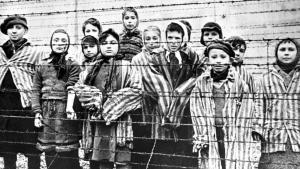This has been a challenging week in class, not because of my students but because of the topics we are studying. On Monday I spent two hours in seminar with thirteen honors students considering Sartre’s play No Exit and Camus’ extended essay The Myth of Sisyphus which begins with the following upbeat observation: “There is but one truly serious philosophical problem, and that is suicide. Judging whether life is or is not worth living amounts to answering the fundamental question of philosophy.”
The next morning in the same team-taught course my colleague from history gave the first of two 75-minute lectures on the Holocaust, just after another colleague and I spent two hours with a bunch of sophomores in our “Apocalypse” course in our first of three classes on Colson Whitehead’s zombie apocalypse novel Zone One (the second class is two more hours this morning). Then this afternoon I’ll be spending two and half hours with nine honors juniors and seniors in my Montaigne colloquium considering several of his essays, one of which is a reflection on–you guessed it–suicide. Fun times!
Next week I will be lecturing in my team taught honors course on “Post-Holocaust Jewish Theology,” the capstone of two weeks on the Holocaust. I found new ways of thinking about the nature of faith about a year ago as I prepared this lecture for the first time. The topic is not my area of expertise; with the help of a close friend who is a Catholic theologian and works, among other things, on Catholic-Jewish interfaith relationships, I selected a handful of articles and excerpts from longer texts that are representative of distinct theological categories of response.
Representing what might be called the “Death of God” perspective which understands the Holocaust to be the end of the Covenant, Rabbi Michael Berenbaum asks “What can we say of the covenant in the wake of Auschwitz? . . . How can we talk of God’s attributes of compassion and mercy in a world of death camps?” while Richard Rubenstein writes:
I have often stated that the idea that a God worthy of human adoration could have inflicted Auschwitz on what was allegedly his people is obscene . . . I have elected to accept what Camus has rightly called the courage of the absurd, the courage to live in a meaningless, purposeless Cosmos rather than believe in a God who inflicts Auschwitz on his people.
At the other end of the interpretive spectrum is “Orthodoxy” which locates the Holocaust in the continuing and unfolding history of the Jewish people and the covenant with God, a history that includes slavery, pogroms, exile, and genocide. As horrific as it was, the Holocaust was the latest chapter in this covenantal history that defines the Jewish soul. Rabbi David Weiss writes that
Judaism has survived until 1939, as it shall now, without denying its God and the covenant with Him . . . A “new covenant,” a “new epoch”—that is a closing of the book of Judaism . . . The covenant is not for review, neither is the eternity of Jewish existence.
The perspective my students and I found most thought-provoking was what might be called the “All is Altered by the Holocaust” framework. We read an extended excerpt from Irving Greenberg’s 1976 Cloud of Smoke, Pillar of Fire, in which Greenberg frames his (and any other) discussion with the following warning:
Let us offer, then, as a working principle the following: No statement, theological or otherwise, should be made that would not be credible in the presence of the burning children.
Greenberg rejects both the “Death of God” and “Orthodoxy” interpretive frameworks because
Both positions give a definitive interpretation of the Holocaust which subsumes it under known classical categories. Neither classical theism nor atheism is adequate to incorporate the incommensurability of the Holocaust.
Modelling Jesus’ suggestion that we should not put new wine into old wineskins, Greenberg argues that traditional theological categories, whether Jewish or Christian, are not credible in the presence of the burning children, in the wake of the Holocaust.
In the aftermath of the Holocaust and other horrific events that human beings have caused and continue to cause, we need to reimagine faith in terms of ebb and flow, presence and absence.
We now have to speak of “moment faiths,” moments when redeemer and vision of redemption are present, interspersed with times when the flames and smoke of the burning children blog out faith—though it flickers again . . . Faith is a life response of the whole person to the Presence in life and history. Like life, this response ebbs and flows. The difference between the skeptic and the believer is frequency of faith, and not certitude of position.
“Moment faith.” This simple phrase provided me with new vocabulary to describe something that I know to be true but that has never fit into the traditional categories that I was taught and have spent my adult life trying to accommodate.
Greenberg’s insight is that when the shit hits the fan, when the worst imaginable becomes a reality, it is a waste of time to try to sustain “faith” in the midst of darkness or to pretend that one’s faith is still as strong as ever. Rather,
Faith is living in the presence of the Redeemer, and in the moment of utter chaos, of genocide, one does not live in his presence. One must be faithful to the reality of the nothingness. Faith is a moment truth, but there are moments when it is not true.
Faith mirrors the ebb and flow of life itself—which should not have been as surprising to me as it actually is. When the worst happens, don’t pretend that you are okay or solid in your faith. Lean into the abyss.
Neither Exodus nor Easter wins out or is totally blotted out by Buchenwald, but we encounter both polar experiences: the life of faith is lived between them. And this dialectic opens new models of response to God.
In her final book Wholehearted Faith, Rachel Held Evans often prefaces an insight with “On the days when I believe,” immediately followed by “And then there are the other days.” I love that because it is so honest and matches my own experience. There are days when the presence of the divine is palpable and I revel in the mystery of my relationship with what is greater than me. There are other days when the existence of God is as unlikely as the existence of unicorns. The only thing that makes me a person of faith rather than an agnostic or skeptic is that there are more of the first kind of day than the second kind of day.












